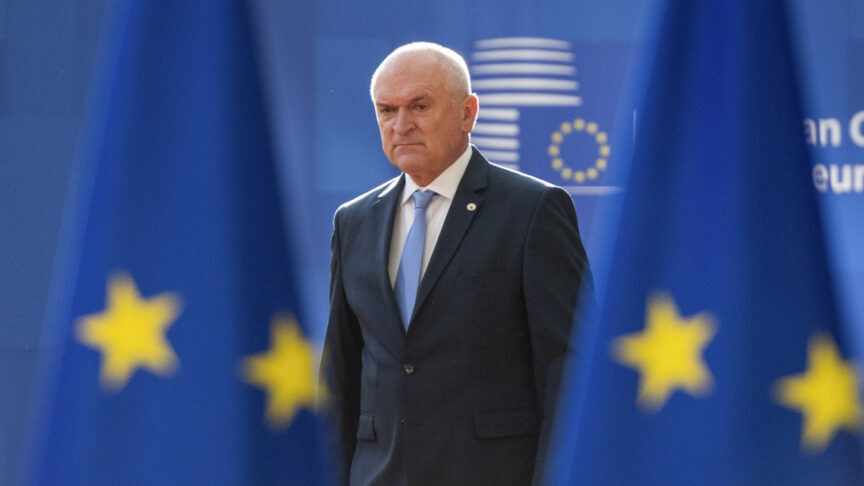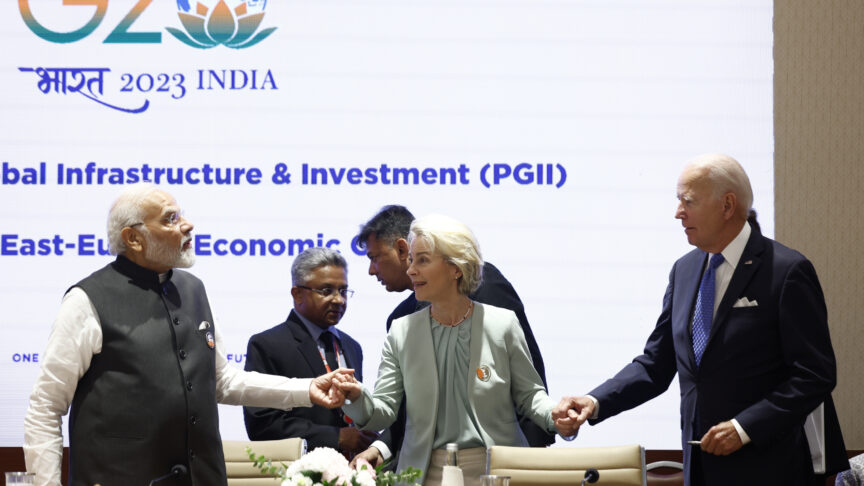The dangers of crisis diplomacy: Italy, China, and Russia
Italy’s game of narratives around the covid-19 crisis poses a risk to the European project.
With the European Union’s economic covid-19 plan now on the table and the lockdown in Italy extended until the beginning of May, the country has just entered the third and most delicate phase of a game of narratives.
The first phase started in March with the intensification of the covid-19 crisis. At that time, most Italian political leaders were ready to stand together to fight the spread of the virus. The sovereigntist exceptions to this were embodied by League leader Matteo Salvini and his Brothers of Italy counterpart, Giorgia Meloni – who make heavy use of propaganda but whose parties hold just 22 percent of seats in the Italian Parliament.
Then, in April, Italy entered the second phase of the game of narratives: displays of solidarity. Italy was on the front line in receiving medical support from the European Union, its member states, the United States, and, most visibly, China and Russia. In this phase, the gradual polarisation of Italy’s coalition government began.
The Five Star Movement strengthened the public narrative praising China and Russia for their unique friendship and support for Italians.
On one side, the Five Star Movement strengthened the public narrative praising China and Russia for their unique friendship and support for Italians. For example, the party argued that this Chinese support was a reward for Italy’s significant engagement with China’s Belt and Road Initiative. According to the Five Star Movement, Italy’s investment in the common project helped it react to the covid-19 emergency more efficiently.
On the other side, the Democratic Party emphasised its gratitude towards Washington and Brussels, making every effort to strengthen Italy’s European and transatlantic relationships. Without dismissing Moscow’s and Bejing’s support, the Democratic Party stressed the importance of caution in public praise that could jeopardise those stronger and more structured relationships.
The second phase had several key features. Russia – traditionally a close friend of rightist Italian politicians such as Salvini and former prime minister Silvio Berlusconi – now deals directly with the anti-establishment Five Star Movement and the centrist prime minister, Giuseppe Conte. However, the situation became somewhat confused due to the Italian government’s delayed and inadequate reaction to alleged threats against a La Stampa journalist from the Russian Ministry of Defence. There is an increasing discrepancy between Rome’s approach to Russia and public perceptions of the country: most Italians do not consider the country to be their biggest friend. Nonetheless, the Italian government – or, at least, half of it – has included Russia in the list of first responders to Italian appeals for international solidarity.
Another key feature of the second phase was that the Five Star Movement, the sole architect of Italy’s major role in the Belt and Road Initiative, helped push forward Beijing’s mask diplomacy narrative – according to which China is rescuing other countries by providing them with medical supplies. While many Western powers were voicing concerns about China’s responsibility for the global spread of the coronavirus, one half of the Italian government transformed itself into the symbol of Chinese aid to the European Union and its member states. This appeared to reaffirm the Five Star Movement’s role as China’s preferred interlocutor in Italy.
Finally, the EU emerged as the biggest loser from this phase, initially proving unable to present a credible narrative about how its management of the covid-19 crisis protected Europeans’ health and economic security. Italians are unlikely to forget their anger at preliminary statements made by European Central Bank President Christine Lagarde and European Commission President Ursula von der Leyen. And the consequences of this are already very visible: 49 percent of Italians now want Italy to leave the EU, a rise of 20 percentage points since November 2018.
Additionally, according to a survey published in the first week of April, 36 percent of Italians believe that China should be Italy’s main partner in developing alliances outside the EU, compared to 30 percent for the United States (the other 34 percent were unsure). Among those who backed China in this role, 53 percent voted for the Five Star Movement and 45 percent for the Democratic Party; among those who backed the US, 51 percent were rightist voters. Therefore, the governing coalition’s electoral base favours relations with China over those with the US. Italians no longer appear to view Russia as a credible ally – perhaps because the pro-Russian Salvini has lost control of the public debate since leaving government.
Now that the EU that has put forward its €1 trillion plan, Italian politics is likely to become increasingly polarised. The Democratic Party will continue to strongly favour the exceptional measures that the EU has created from scratch, convinced that Italy cannot hope for greater economic support or concessions from the bloc. Meanwhile, sovereigntist parties will call for the resignation of Economy Minister Roberto Gualtieri or even the entire government, characterising its acceptance of the EU deal as a betrayal. And the Five Star Movement, which was the invisible hand behind Conte’s nomination as prime minister, will remain divided into representatives who work behind the scenes to establish a harder Italian position and public-facing and institutional representatives who take a more cautious approach to the deal, such as some Five Star Movement ministers.
The fourth phase will likely start when the government gradually ends the lockdown, with citizens partially returning to their former lives and the Italian political class evaluating the management of the covid-19 crisis and Italy’s economic recovery plan. Italian leaders will soon face an exceptional J’accuse! – as befits exceptional times. Italy may become stuck in another dangerous game of narratives that has vital implications for not only its future in Europe but also the European project itself, which is already being tested in these difficult days. Yet Europe can still play a major role in the fourth phase of the current game of narratives, by speaking with one voice to overcome the north-south divide and by making solidarity the political foundation of its response to the trials still to come.
The European Council on Foreign Relations does not take collective positions. ECFR publications only represent the views of their individual authors.


